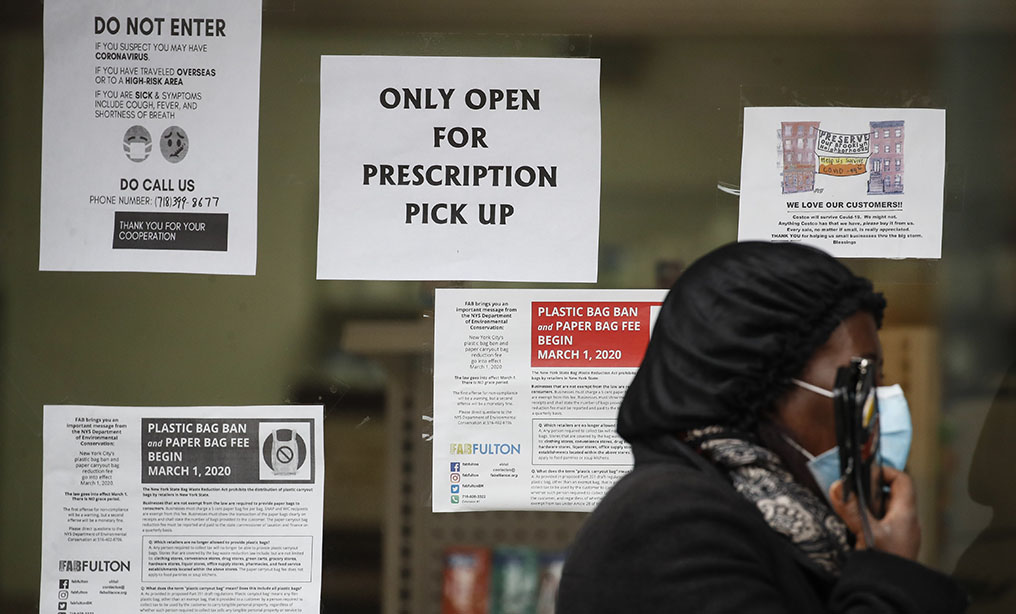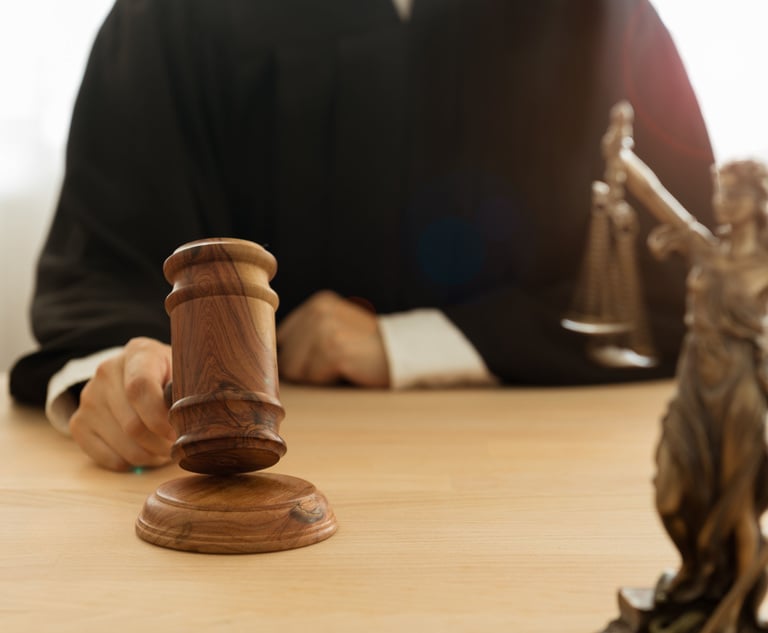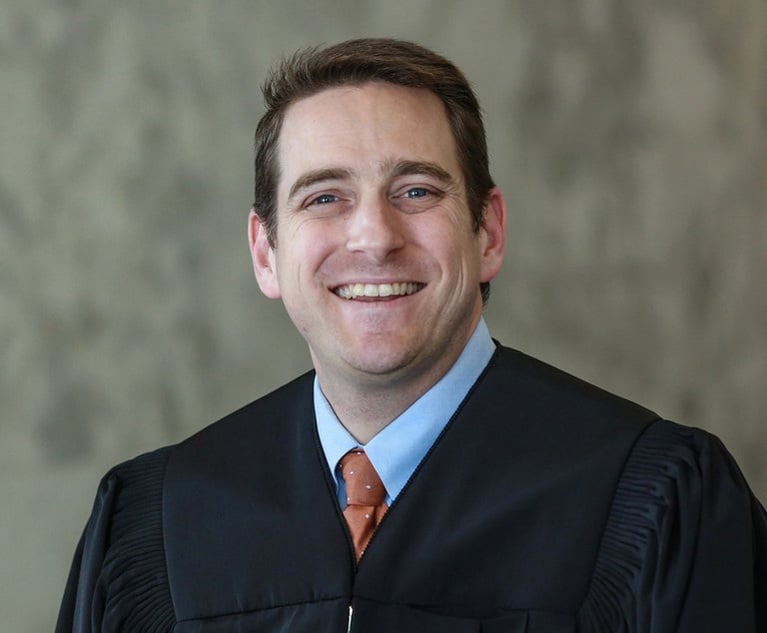Legal Industry Not First in Line as Cuomo Outlines Reopening Plan for New York Businesses
The reopening plan could have widespread impacts for when—and in what ways—law firms and attorneys across New York return to in-office work.
April 27, 2020 at 06:11 PM
4 minute read
The original version of this story was published on New York Law Journal
 A storefront in Brooklyn on Monday. New York state remains under sweeping lockdown measures spurred by the coronavirus pandemic. Photo: John Minchillo/AP
A storefront in Brooklyn on Monday. New York state remains under sweeping lockdown measures spurred by the coronavirus pandemic. Photo: John Minchillo/AP
Manufacturing and construction operations would be the first industries to be put back into business under a reopening plan outlined by Gov. Andrew Cuomo on Sunday. The legal profession, particularly in New York City, would have to wait for a while until freely using offices for services defined as "nonessential."
New York state remains under sweeping lockdown measures spurred by the coronavirus pandemic, which has infected at least 291,000 people statewide.
The measures, which are aimed at reducing the in-person interactions that spread the virus, sharply curtail gatherings and require nonessential workers to stay home. The measures are in place until mid May through an executive order.
At a coronavirus briefing Sunday, Cuomo traced details of the state's plan to reopen New York's paralyzed economy, saying the first phase would include reopening manufacturing and construction operations that are low risk.
More businesses would open in the second phase, but those reopening decisions will be based on how essential the business is and the infection risk associated with operating the business, he said.
The legal industry's adaptation to working from home and virtual courts has eased some of the strictures wrought by Cuomo's "New York on Pause" order, but it is also anticipating benefits if reopening can widen.
Hank Greenberg, president of the New York State Bar Association, said the reopening period carries "enormous" importance to the legal profession statewide.
Many lawyers have transitioned to virtual operations, he said, but the benefits office operations are unavoidable. In-person interactions make it easier to empathically listen to a distressed client, he said, and brainstorming ideas and collaboration is more effective in a physical law office.
"The perfect truth is [that] practicing law is a team effort in many cases," he said.
He anticipated that commercial lawyers are going to be immersed in a raft of issues from their clients, including human resources, public health and liability topics.
The reopening plan could have widespread impacts for when—and in what ways—law firms and attorneys across New York return to in-office work.
According to guidance from the state government, legal service providers are considered essential businesses, but only if their work is tied to specific topics like supporting a criminal defendant in a court proceeding. It also includes supporting the essential functions of "health care providers, utilities, state and local governments, the federal government" and other businesses that have been deemed essential.
Even as the state looks ahead to opening businesses, the state's court system is angling toward expanding its virtual operations, instead of emphasizing the widespread reopening of physical courthouse operations.
Chief Judge Janet DiFiore said Monday in video speech that they are working to improve the temporary virtual operations.
DiFiore reported that 168 court staff and judges have tested positive for the new coronavirus. A court spokesman said judges made up 17 of those positive COVID-19 cases.
And New York's Chief Administrative Judge Lawrence Marks said Wednesday that there have been no conversations around the widespread opening of courthouses.
State officials said a two-week period between the phases can be expected in order to monitor the effects. The reopening plan is also set to leave out attractions and openings that would draw a large number of people.
Despite plans of restarting the economy, Cuomo on Monday cautioned that a bungled reopening plan could cause the infection rate to turn upward once again.
"There is no light switch where you flick a switch and everybody goes back to doing what they're doing," he said Monday. "We have to take these circumstances into consideration. We have to learn the lessons."
READ MORE:
'A Very Different Court System': Marks Says There's No Timeline for Lifting Ban on New 'Nonessential' Lawsuits in NY
'Herculean Effort': DiFiore Hails Results of NY's Expanded Virtual Court Operations
Seven Northeast Governors Rollout Working Group for Reopening of Economy
This content has been archived. It is available through our partners, LexisNexis® and Bloomberg Law.
To view this content, please continue to their sites.
Not a Lexis Subscriber?
Subscribe Now
Not a Bloomberg Law Subscriber?
Subscribe Now
NOT FOR REPRINT
© 2025 ALM Global, LLC, All Rights Reserved. Request academic re-use from www.copyright.com. All other uses, submit a request to [email protected]. For more information visit Asset & Logo Licensing.
You Might Like
View All
Landlord Must Pay Prevailing Tenants' $21K Attorney Fees in Commercial Lease Dispute, Appellate Court Rules
4 minute read
Federal Laws Also Preempt State's Swipe Fee Law on Out-of-State Banks, Judge Rules
3 minute read
Judge Accuses Trump of Constitutional End Run, Blocks Citizenship Order
3 minute readTrending Stories
- 1Orrick Picks Up 13-Lawyer Tech, VC Group From Gunderson Dettmer
- 2How Alzheimer’s and Other Cognitive Diseases Affect Guardianship, POAs and Estate Planning
- 3How Lower Courts Are Interpreting Justices' Decision in 'Muldrow v. City of St. Louis'
- 4Phantom Income/Retained Earnings and the Potential for Inflated Support
- 5Should a Financially Dependent Child Who Rejects One Parent Still Be Emancipated?
Who Got The Work
J. Brugh Lower of Gibbons has entered an appearance for industrial equipment supplier Devco Corporation in a pending trademark infringement lawsuit. The suit, accusing the defendant of selling knock-off Graco products, was filed Dec. 18 in New Jersey District Court by Rivkin Radler on behalf of Graco Inc. and Graco Minnesota. The case, assigned to U.S. District Judge Zahid N. Quraishi, is 3:24-cv-11294, Graco Inc. et al v. Devco Corporation.
Who Got The Work
Rebecca Maller-Stein and Kent A. Yalowitz of Arnold & Porter Kaye Scholer have entered their appearances for Hanaco Venture Capital and its executives, Lior Prosor and David Frankel, in a pending securities lawsuit. The action, filed on Dec. 24 in New York Southern District Court by Zell, Aron & Co. on behalf of Goldeneye Advisors, accuses the defendants of negligently and fraudulently managing the plaintiff's $1 million investment. The case, assigned to U.S. District Judge Vernon S. Broderick, is 1:24-cv-09918, Goldeneye Advisors, LLC v. Hanaco Venture Capital, Ltd. et al.
Who Got The Work
Attorneys from A&O Shearman has stepped in as defense counsel for Toronto-Dominion Bank and other defendants in a pending securities class action. The suit, filed Dec. 11 in New York Southern District Court by Bleichmar Fonti & Auld, accuses the defendants of concealing the bank's 'pervasive' deficiencies in regards to its compliance with the Bank Secrecy Act and the quality of its anti-money laundering controls. The case, assigned to U.S. District Judge Arun Subramanian, is 1:24-cv-09445, Gonzalez v. The Toronto-Dominion Bank et al.
Who Got The Work
Crown Castle International, a Pennsylvania company providing shared communications infrastructure, has turned to Luke D. Wolf of Gordon Rees Scully Mansukhani to fend off a pending breach-of-contract lawsuit. The court action, filed Nov. 25 in Michigan Eastern District Court by Hooper Hathaway PC on behalf of The Town Residences LLC, accuses Crown Castle of failing to transfer approximately $30,000 in utility payments from T-Mobile in breach of a roof-top lease and assignment agreement. The case, assigned to U.S. District Judge Susan K. Declercq, is 2:24-cv-13131, The Town Residences LLC v. T-Mobile US, Inc. et al.
Who Got The Work
Wilfred P. Coronato and Daniel M. Schwartz of McCarter & English have stepped in as defense counsel to Electrolux Home Products Inc. in a pending product liability lawsuit. The court action, filed Nov. 26 in New York Eastern District Court by Poulos Lopiccolo PC and Nagel Rice LLP on behalf of David Stern, alleges that the defendant's refrigerators’ drawers and shelving repeatedly break and fall apart within months after purchase. The case, assigned to U.S. District Judge Joan M. Azrack, is 2:24-cv-08204, Stern v. Electrolux Home Products, Inc.
Featured Firms
Law Offices of Gary Martin Hays & Associates, P.C.
(470) 294-1674
Law Offices of Mark E. Salomone
(857) 444-6468
Smith & Hassler
(713) 739-1250









